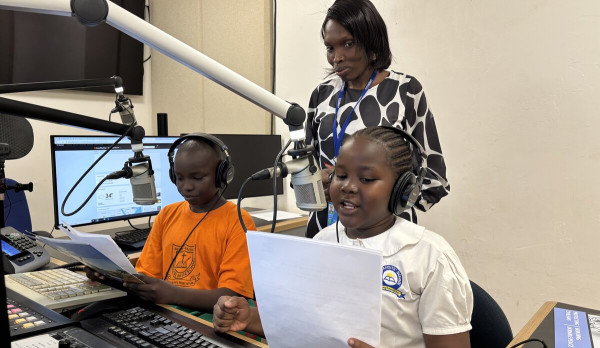
Schoolchildren are calling on the government to prioritize education to secure their future as they met to commemorate the Day of the African Child in Juba, South Sudan.
At an all-day jamboree hosted by Radio Miraya, operated by the United Nations Mission in South Sudan, 20 schoolchildren from two schools took over programs and hammered home the message that quality education is paramount to the future of the country’s young population.
“If South Sudan is to become as developed as Uganda and Kenya, then our government needs to invest in training for our teachers and provide resources for our schools,” says 12-year Torosa Addisan from the Bishop Mazzoldi Memorial Basic School.
“That way, we can all learn the best education methods and improve our examination scores,” he says to nods from the other three children who, together with him, hosted the Miraya Breakfast Show.
Over in another studio, 11-year-old Naima Alex from the Juba Parents School is one half of a duo reading out the news in English to listeners.
Although still an adolescent, Naima thinks for a while before saying that she is very concerned about the future and has her heart set on becoming a doctor when she grows up.
But for now, English is her favorite subject at school.
“I like English because it allows me to read more and to learn new things and to understand about the world. I want to become a doctor so that I can save lives in South Sudan and take care of people when they become sick,” says Naima.
The Day of the African Child honors South African school children who lost their lives in 1976 while leading a revolt against the Apartheid government to seek a better education.
Every year, UNMISS commemorates this day by giving school children a platform on Radio Miraya to speak about their challenges and to suggest solutions in their own words.
Children in South Sudan face overwhelming challenges as the country grapples with some of the lowest indicators on the continent for children’s health, nutrition, and education.
A report from the UN Children’s Fund (UNICEF) indicates that over 70% of South Sudanese children are out of school due to a combination of factors, including conflict, displacement, and natural hazards such as seasonal flooding.
This is compounded by the lack of educational facilities and poorly trained teachers.
Fourteen-year-old Intisar Faisal from Juba Parents School is one of the most fluent Arabic speakers in her class. Today she reads out the news in Arabic alongside Radio Miraya’s anchor, Abraham Malek, who commends her calmness after they complete the broadcast.
Asked about the significance of the day and why it matters to her, she is quiet at first. Naturally shy, she thinks for a while and then says: “African children need to be provided with more education opportunities, and I want to tell all the girls that we must complete school if we want to have a bright future.”
Today’s rendition of The Beat programme was led by 13-year-old Irvei Deng and four other children who take listeners through an hour of upbeat music, a snapshot of the day’s newspaper headlines, a reading of the weather, and even calls from listeners.
“I loved the experience,” says Irvei, her eyes twinkling with joy. “At first, I was a little nervous, but it felt so nice to be connected and to get those live calls from people.” Her co-hosts could not match her enthusiasm, but they all looked equally pleased to have been a part of the show to commemorate the Day of the African Child.
Distributed by APO Group on behalf of United Nations Mission in South Sudan (UNMISS).



